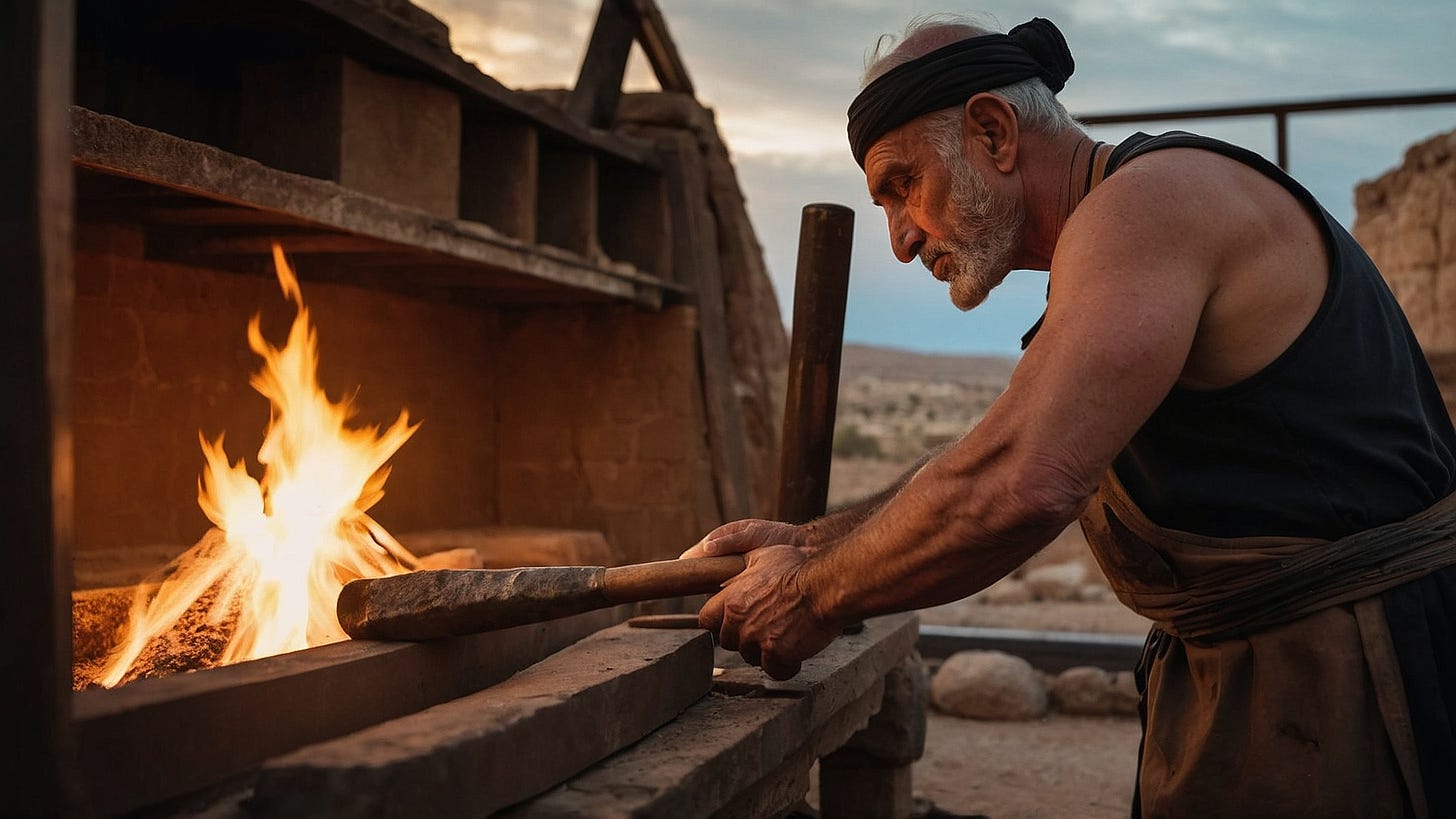Tubalcain - The Power of Human Ingenuity
In the mists of time, a figure emerges from the pages of the Bible, a master craftsman whose name echoes through the ages: Tubalcain (too-bahl-kayn). This enigmatic character, mentioned briefly in the Book of Genesis, is a descendant of Cain and brother to Naamah. Yet, his legacy extends far beyond his genealogy, for Tubalcain is described as a skilled metalworker, a forger of instruments of bronze and iron.
As Freemasons, we recognize the significance of Tubalcain's craft. His mastery over metals represents the power of human ingenuity and the potential for progress. In our teachings, Tubalcain symbolizes the pursuit of knowledge and the value of skill in the service of humanity.
But what deeper meanings lie beneath the surface of Tubalcain's story? To truly understand his significance, we must delve into the historical and cultural context of his time and explore the allegorical and symbolic interpretations of his life and work.
📆 Make Daily Progress in Masonic Knowledge Across other formats:
YouTube: https://www.youtube.com/@DailyMasonicProgress
Podcast: Apple Podcasts | Spotify | Amazon Music | iHeartRadio
In the biblical narrative, Tubalcain emerges during the early generations of humanity, a time marked by the development of civilization and the growth of human knowledge. As a metalworker, Tubalcain would have been at the forefront of technological advancement, crafting tools and weapons that shaped the course of history.
The very metals he worked with, bronze and iron, carry symbolic weight. Bronze, an alloy of copper and tin, represents the combining of elements to create something stronger and more durable. Iron, with its strength and potential for both creation and destruction, symbolizes the dual nature of human power.
In Masonic tradition, Tubalcain is often associated with the concept of the "master craftsman," one who has honed his skills and knowledge to the highest level. This mastery is not merely technical, but also moral and spiritual. The true craftsman understands the responsibility that comes with his abilities and uses them for the betterment of himself and others.
As we consider Tubalcain's role as a master craftsman, we must also confront the challenges and temptations that come with great skill and knowledge. How do we ensure that our abilities are used for good and not for ill?
Imagine, for a moment, that you are Tubalcain, standing at the forge, hammer in hand. The fire blazes before you, and the metal glows red-hot, ready to be shaped by your will. In this moment, you hold the power to create or destroy, to fashion tools that will help your fellow man or weapons that will bring harm.
This is the choice that faces us all, as Freemasons and as human beings. We have been given the gift of knowledge and the ability to shape our world, but with that power comes great responsibility (thanks Uncle Ben— although originally Voltaire). Like Tubalcain, we must decide how we will use our skills and resources.
Will we be like the bronze, combining our strengths with others to create something greater than ourselves? Will we be like the iron, strong and unyielding in our principles, even in the face of adversity? Or will we succumb to the temptations of pride and ambition, using our abilities for selfish gain?
These are the questions that Tubalcain's story poses to us, and to answer them, we must look to the deeper philosophical and ethical teachings of Freemasonry.
In Masonic philosophy, the story of Tubalcain is a reminder of the importance of using our talents and resources wisely. The operative mason, who works with physical tools and materials, must ensure that his creations are sound and beneficial. The speculative mason, who works with the tools of moral and spiritual development, must likewise ensure that his thoughts and actions are in line with Masonic principles.
At its core, Freemasonry teaches us to be good men and true, to act with integrity and compassion, and to use our abilities for the benefit of all. Tubalcain's story, with its themes of craftsmanship and responsibility, embodies these teachings.
So, what can we, as Freemasons, learn from the example of Tubalcain? How can we apply the lessons of his life and work to our own personal and Masonic journeys?
In the end, Tubalcain's legacy is one of skill, knowledge, and responsibility. As Freemasons, we are called to follow in his footsteps, to hone our craft and use our abilities for the greater good.
This means constantly seeking to improve ourselves, both in our Masonic work and in our daily lives. It means being mindful of the impact our actions have on others and on the world around us. And it means using our resources, whether material or intellectual, to make a positive difference.
Tubalcain's story also reminds us of the importance of balance. Just as the metals he worked with required the right combination of elements to achieve their full potential, so too must we strive for balance in our own lives. We must temper our ambitions with humility, our passions with reason, and our desires with duty.
In the forge of life, we are all craftsmen, shaping our destinies and the destinies of those around us. Let us, like Tubalcain, wield our hammers with skill and purpose, ever mindful of the responsibility that comes with the power to create and transform.
So, let us ask ourselves: What will we forge with the tools and talents we have been given? Will we create works of beauty and strength, or will we succumb to the temptations of pride and self-interest? The choice is ours, and the legacy we leave will be the measure of our craft.




